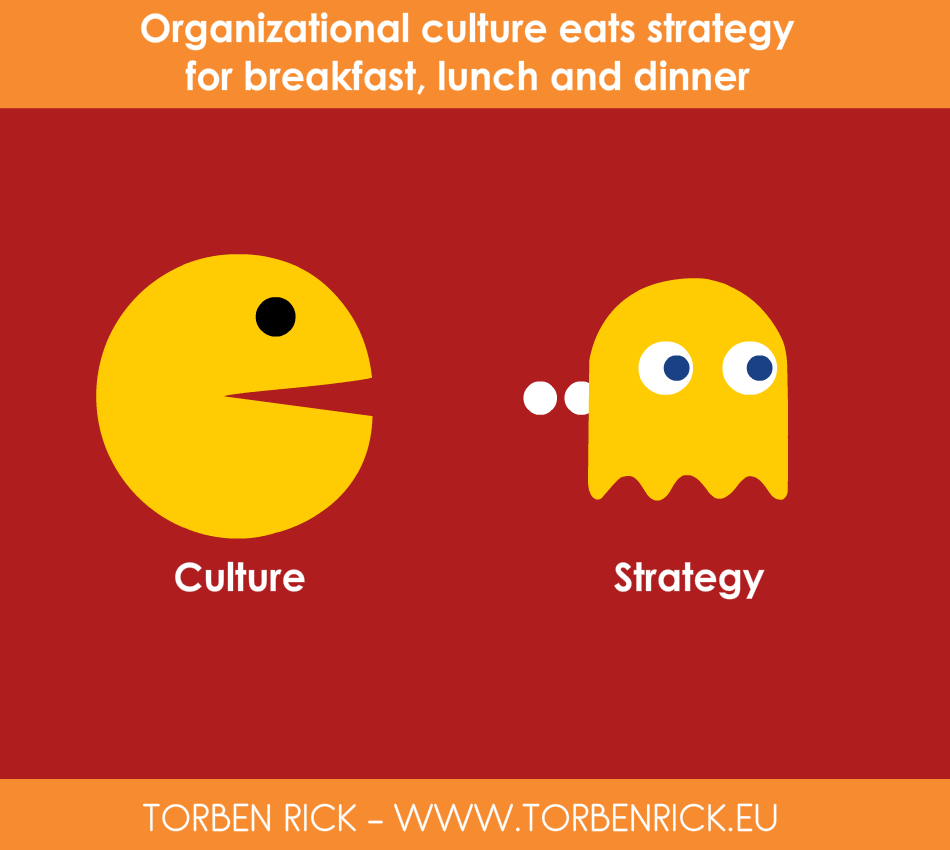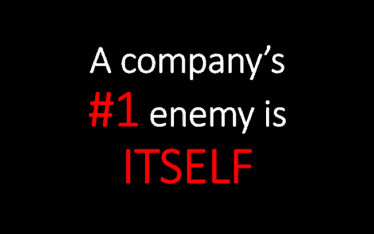Successful execution of strategy
Creating a strategy aligned organizational culture – The critical role of organizational culture
A brilliant strategy, blockbuster product, or breakthrough technology can put you on the competitive map, but only solid execution can keep you there. Execution of a sound strategy very much depends upon the organizational culture.
If strategy is deciding what to do, execution is all about making it happen. It’s the follow through.
The organizational Pac-Man is always hungry
A company’s capacity to quickly and effectively execute business strategy is, in itself, a competitive differentiator, one that is highly correlated with positive market performance.
But this ability isn’t common. It’s estimated that more than 60% of strategies are not successfully implemented. In many cases the problem can be boiled down to the fact that the execution of strategy is not supported by the culture of the organization.

Create and maintain the right cultural fit for the strategy
When companies get the culture right – by aligning it to the strategy – there is a much higher rate of success than when culture is not aligned to strategy.
Culture eats strategy, but strategy needs culture for sustenance. A culture without strategy is like a ship of fools – yet a strategy without culture is but a dream. Culture and strategy are inseparable.
So don’t leave organizational culture unattended!
Short URL & title:
Successful execution of strategy depends upon the organizational culture — https://www.torbenrick.eu/t/r/fkk
Share it:
If you enjoyed this article, please take 5 seconds to share it on your social network. Thanks!








Excellent insights. You are right on the money. Thank you.
Strategy does not necessarily depend on organizational culture because a strategy may itself be to ‘change the culture’ away from one that is not accepting of strategic leadership. Successful strategy execution depends on:
1) a real strategy being identified (that is incremental, dynamic and adaptable)
2) ability of leadership to mandate it
3) ability of teams to deliver it
4) ability of leadership to dynamically adapt it as delivery takes shape and the underlying business environment changes.
See: James Brian Quinn, “Strategies for Change – Logical Incrementalism”, Irwin, 1980, and, Douglas B Gutnecht, “Strategic Revitalization”, University Press of America, 1985.
Organizing is crucial, but you need to be prepared for a change in the plan. Flexibility makes leaders great.
A good way to stay ahead is to find the right balance between staying on course and adaptivity. But you are definitely right – the ability to follow a plan and execute it well is king.
Cheers!
Dear Torben, thank you for this short, but insightful article.
I’ve recently reviewed Palladium Group’s report and summarized 3 problems that were pointed in this report as main ones: changing business model; vertical alignment, choosing right strategy execution tool.
I think your post provides the essence: the ultimate problem is actually with company’s culture. All those strategy execution efforts will work much better when there would be a culture of performance excellence across the company.
Probably something similar to the Kaizen’s continuous improvement, but applied to the strategy execution excellence…
“The organizational Pac-Man is always hungry.” I like this one because it’s so true! You may have the best idea for the company, but if the CEO doesn’t support you, it just won’t work.